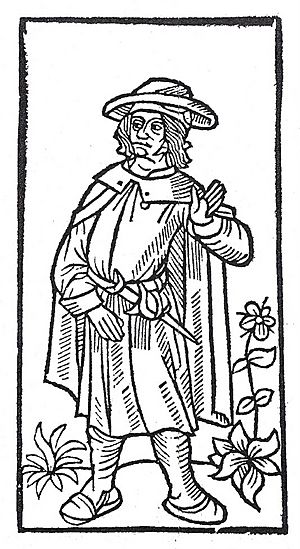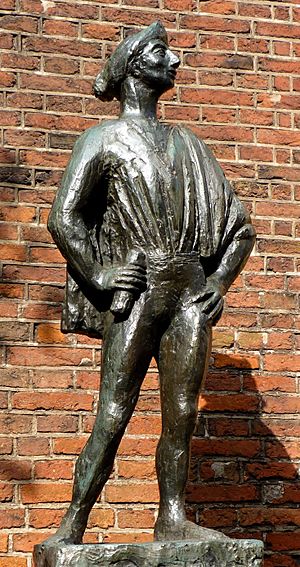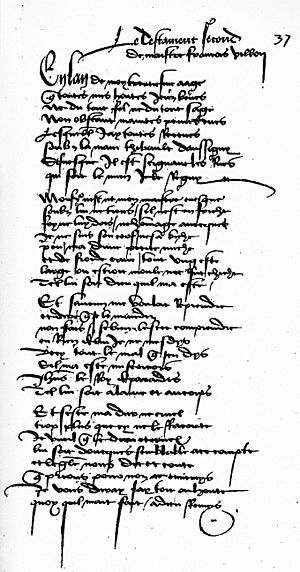François Villon facts for kids
Quick facts for kids
François Villon
|
|
|---|---|

Stock woodcut image, used to represent François Villon in the 1489 printing of the Grand Testament de Maistre François Villon
|
|
| Born | c. 1431 Paris, France |
| Died | after 1463 (aged 31–32) |
| Occupation | Poet, thief |
| Language | Middle French |
| Education | master's degree |
| Alma mater | University of Paris |
| Notable works | Le Testament, "Ballade des pendus" |
François Villon (born around 1431 – disappeared after 1463) was a famous French poet from the Late Middle Ages. He is known for his unique poems, which often shared details about his life and the troubles he faced with the law.
Contents
Biography
Birth and Early Life
François Villon was born in Paris, France, around the year 1431. His real name might have been François de Montcorbier or François des Loges. However, he always used the name Villon in his poems.
Villon grew up in a poor family. He was raised by his foster father, Guillaume de Villon. Guillaume was a chaplain and a professor of canon law (church law). He took François into his home and was "more than a father" to him.
Student Years
Villon started studying at a young age, perhaps around 12 years old. He attended the University of Paris. He earned his first degree, a bachelor's degree, in 1449. Three years later, in 1452, he earned a master's degree. Not much is known about what he did between 1452 and 1455.
Le Testament
We know that in the summer of 1461, Villon was held in a bishop's prison. The reason for his imprisonment is not fully clear. He was likely set free when King Louis XI came to power on October 2, 1461.
In that same year, 1461, Villon wrote his most famous work, Le Testament. This long poem is also known as Le Grand Testament. In the autumn of 1462, he was back living near the church of Saint-Benoît.
Troubles and Disappearance
In November 1462, Villon was arrested again, this time for theft. He was taken to a large fortress in Paris called the Grand Châtelet. He was later released on bail. However, he quickly got into another street fight. He was arrested once more and sentenced to be executed.
Luckily, his sentence was changed to banishment (being forced to leave the city) on January 5, 1463. After this date, no one knows what happened to François Villon. He simply disappeared. Some people think he might have died soon after leaving Paris, but his exact fate remains a mystery.
Works
Villon wrote a shorter poem called Le Petit Testament (also known as Le Lais) in late 1456. This poem is a funny, ironic "will" where he lists gifts for his friends and people he knew.
His most important work is Le grand testament, written in 1461–1462. Villon himself seemed to think this was his best work.
Besides these two main poems, Villon wrote many other shorter poems. Some are serious, while others are light-hearted. There are also some poems written in a special language or slang used by people in the underworld of Paris. Many experts believe these were written by other poets trying to copy Villon's style.
Villon's Unique Style

Villon was very creative with his poetry. He often wrote about new topics and changed how poems were usually structured. He understood the traditional ideas of medieval poetry, but he often wrote in a different way. He liked to joke and use humor, and he was always trying new words and phrases.
Villon's poems often talk about his own life. They share his experiences with poverty, difficulties, and legal troubles. His poems are full of hidden jokes and mysteries. They also use the slang of his time and the special language of the Parisian underworld. He even included the names of real people from medieval Paris, like rich citizens, government officials, and police.
English Translations
Many people have translated Villon's poems into English so that more readers can enjoy them.
One of the most famous lines from Villon's work is "Where are the snows of yester-year?" This line comes from his poem Ballade des dames du temps jadis (Ballad of the Ladies of Time Past). The original French line is: "Mais où sont les neiges d'antan?"
This famous line was translated by Dante Gabriel Rossetti in 1867. Another American poet, Richard Wilbur, also translated the same poem. In his version, the line is "But where shall last year's snow be found?"
Popularity of Villon's Poems
Villon's poems became very popular soon after he wrote them. In 1489, a printed book of his poems was published. Many other editions followed quickly. In 1533, a famous French poet and scholar named Clément Marot published an important edition. He recognized Villon as one of the most important poets in French literature. Marot also worked to fix mistakes that earlier printers had made in the poems.
See also
- Le Testament
- List of people who disappeared
- In Spanish: François Villon para niños
 | Victor J. Glover |
 | Yvonne Cagle |
 | Jeanette Epps |
 | Bernard A. Harris Jr. |


